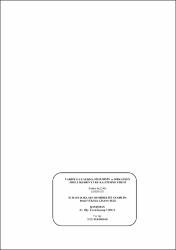| dc.contributor.author | Alcan, Emine | |
| dc.date.accessioned | 2020-01-07T07:10:47Z | |
| dc.date.available | 2020-01-07T07:10:47Z | |
| dc.date.issued | 2019 | |
| dc.identifier.uri | https://hdl.handle.net/20.500.11776/3378 | |
| dc.description.abstract | Bu çalışma hemşirelerin sirkadyen özellikleri, uyku kalitesi ve gündüz uykululuk durumlarını etkileyen faktörleri belirlemek amacıyla tanımlayıcı olarak planlanmıştır. Araştırma Haziran-Ekim 2018 tarihleri arasında, Tekirdağ ilinde Sağlık Bakanlığı’na bağlı bulunan hastanelerden 50 ve daha fazla sayıda hemşirenin çalıştığı Tekirdağ Devlet Hastanesi, Tekirdağ Çorlu Devlet Hastanesi, Tekirdağ Malkara Devlet Hastanesi, Tekirdağ Çerkezköy Devlet Hastanesi’nde yürütülmüştür. Araştırmanın yürütüldüğü hastanelerde çalışan 504 hemşire araştırmada yer almıştır. Veriler “Hasta Tanılama Formu”, “Sabahçıl-Akşamcıl Ölçeği”, “Pittsburg Uyku Kalitesi Ölçeği”, “Epworth Uykululuk Ölçeği” kullanılarak elde edilmiştir. Verilerin değerlendirilmesinde yüzdelik, ortalama, t testi, Mann Whitney U testi, Pearson ki-kare, Kruskal Wallis, ANOVA, korelasyon ve regresyon analizlerinden yararlanılmıştır. Çalışmada yer alan hemşirelerin yaş ortalaması 32,32±7,02 yıl olup, %85,9’u kadın, %59,3’ü bekâr, %67,1’i lisans düzeyinde eğitim almıştı. Hemşirelerin Pittsburg Uyku Kalitesi Ölçeği toplam puan ortalaması 6,24±3,02 olarak hesaplanmış, %56,2’sinin uyku kalitesinin kötü olduğu belirlenmiştir. Epworth Uykululuk Ölçeği’den aldıkları toplam puan ortalaması 6,64±4,54 olarak hesaplanmış ve %17,9’unda (n=90) artmış gündüz uykululuğu saptanmıştır. Sabahçıl-Akşamcıl Ölçeği toplam puan ortalaması 48,56±8,42 olup, hemşirelerin %11,3’ünün (n=57) kronotip özelliğinin sabahçıl, %20,2’sinin (n=102) akşamcıl ve %68,5’inin (n=345) ara tipte olduğu belirlenmiştir. Gündüz çalışanların %48,4’ünde, vardiyalı çalışanların %57,2’sinde uyku kalitesi kötü olup, vardiyalı çalışanlarda gündüz uykululuğu daha fazladır (p<0,05). Kronotip özelliklerine göre akşamcıl özelliğe sahip olan hemşirelerin uyku kalitesi daha kötü ve gündüz uykululuğu daha fazla bulunmuştur (p<0,01). Sonuçlar doğrultusunda, hemşirelerin uyku kalitesinin artırılması için çalışma düzenlerinin oluşturulmasında sirkadyen özelliklerinin dikkate alınması önerilmektedir. | en_US |
| dc.description.abstract | This descriptive study was planned to determine the factors affecting the circadian characteristics, sleep quality, and daytime sleepiness of nurses. The study was conducted between June and October 2018 in the city of Tekirdağ in the Tekirdağ Public Hospital, Tekirdağ Çorlu Public Hospital, Tekirdağ Malkara Public Hospital, and Tekirdağ Çerkezköy Public Hospital , all of which are tied to the Department of Health and all of which employ at least 50 nurses. 504 nurses employed at the aforementioned hospitals were included in the study. Data was collected using a “Patient Identification Form”, the “Diurnal-Nocturnal Scale”, the “Pittsburgh Sleep Quality Scale”, and the “Epworth Sleepiness Scale”. In data evaluation, percentages, mean values, the t test, Mann Whitney U test, the Pearson chi squared test, Kruskal Wallis, ANOVA, correlation analysis, and regression analysis were used. The mean age of the nurses included in the study was 32,32±7,02, 85.9% were female, 59.3% were single, and 67.1% had bachelor’s degrees. The total mean score of the nurses from the Pittsburgh Sleep Quality Scale was calculated to be 6,24±3,02, with 56.2% of the nurses having poor sleep quality. The total mean score from the Epworth Sleepiness Scale was calculated to be 6,64±4,54, and daytime sleepiness was found to be present in 17.9% (n=90) of the nurses. The total mean score from the Diurnal-Nocturnal Scale was 48,56±8,42, where 11.3% (n=57) of the nurses were found to be chronotypically diurnal, 20.2% (n=102) were found to be nocturnal, and 68.5% (n=345) were found to be intermediate type. Sleep quality was poor in 48.4% of those who worked during the day and 57.2% of those who worked in shifts, and daytime sleepiness was greater among those who worked in shifts (p<0.05). Nurses who had a nocturnal chronotype were found to have poorer sleep quality and greater daytime sleepiness (p<0.01). According to those results, it is recommended to take circadian characteristics into consideration when forming working patterns in order to increase the sleep quality of nurses. | en_US |
| dc.language.iso | tur | en_US |
| dc.publisher | Namık Kemal Üniversitesi | en_US |
| dc.rights | info:eu-repo/semantics/embargoedAccess | en_US |
| dc.subject | Vardiyalı çalışma | en_US |
| dc.subject | Uyku kalitesi | en_US |
| dc.subject | Hemşire | en_US |
| dc.subject | Sirkadyen özellikler | en_US |
| dc.subject | Shift Working | en_US |
| dc.subject | Sleep Quality | en_US |
| dc.subject | Nurse | en_US |
| dc.subject | Circadian Characteristics | en_US |
| dc.title | Vardiyalı çalışma sisteminin ve sirkadyen özelliklerin uyku kalitesine etkisi | en_US |
| dc.title.alternative | The effect of shift working patterns and circadian characteristics on sleep quality | en_US |
| dc.type | masterThesis | en_US |
| dc.department | Enstitüler, Sağlık Bilimleri Enstitüsü, İç Hastalıkları Hemşireliği Ana Bilim Dalı | en_US |
| dc.relation.publicationcategory | Tez | en_US |



















